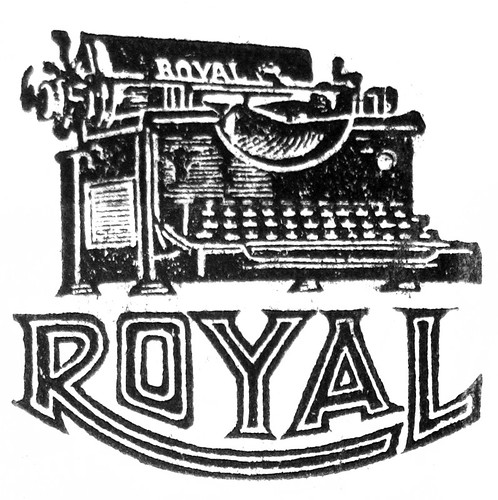
- TypewriterGuy
- Typewriter Talk Vet
 Offline
Offline 
- From: United States
- Registered: 24-4-2015
- Posts: 1,250
Newly Rebuilt Typewriters
As you guys may know, I do love Words are Winged and attempt whatever disassembly he does.
So thats what I do.
If you guys are somewhat experienced in typewriters, I HIGHLY RECOMMEND following his guides to dissemble and re assemble a typewriter. The difference between a clean typewriter between a rebuilt one is amazing. I rebuilt my Oliver 9, and the difference is just crazy.
Heres a photo of it stripped to the frame: Back together
Back together
Back from a long break.
Starting fresh with my favorite typer. A Royal Futura!
- Uwe
- Moderator
 Offline
Offline 
- From: Toronto, Canada
- Registered: 12-3-2013
- Posts: 4,410
Re: Newly Rebuilt Typewriters
I can hear the thumping of professional repairmen the world over as they collectively begin to bang their heads on workbenches right now... ![]()
The pronoun I has always been capitalized in the English language for more than 700 years.
- TypewriterGuy
- Typewriter Talk Vet
 Offline
Offline 
- From: United States
- Registered: 24-4-2015
- Posts: 1,250
Re: Newly Rebuilt Typewriters
Hahaha that Tyler at Words are Winged, its his fault!
But really, at the very least, read through his guides. Its amazing how much more I know about typewriters know.
Back from a long break.
Starting fresh with my favorite typer. A Royal Futura!
- •
- TypewriterKing
- Inactive Account
 Offline
Offline - From: DeepInTheHeartO', Texas
- Registered: 17-2-2016
- Posts: 1,011
Re: Newly Rebuilt Typewriters
My hat goes off to anyone who can disassemble a typewriter right down to the frame and put it back together again. Just tearing one down is WORK. I partially tore down a 1956 Underwood, removed all the really badly rusted parts, cleaned what was left, put many parts of a 1959 Underwood into it, adjusted it out, and got it to working again. It took all of about four days, and it was only a PARTIAL teardown. But I will say, as TypewriterGuy has said, a rebuilt typewriter works better than one that's only been merely cleaned. The machine I came out with has the straightest print (I replaced the typebars AND the segment slots they came with. I was very lucky the set was still straight after about forty-odd years), the best feel, and the best performance.
Underwood--Speeds the World's Bidness
- KatLondon
- Key Master
 Offline
Offline 
- From: London
- Registered: 11-10-2014
- Posts: 995
Re: Newly Rebuilt Typewriters
Then, again, I just did a search on Words Are Winged, and the VERY FIRST paragraph on which my eye fell was this one:
In what I can only describe as a nightmare to deal with, I foolishly messed with the tuning screws on the machine (of which there are 4 directly related to the ability of the typewheel mechanism to function). As far as I am now aware, you DO need the proper factory manuals to deal with tuning these screws else everything will jam up.Though it shames me to admit it, when I was trying to pry the typewheel off I had also inadvertently broken a small, teeny bit…
I mean, it sounds great that you guys were able to get your machines to work so much better - but I'm reasonably sure that a policy of minimum necessary intervention is a better one. In my experience, cleaning - and cleaning again, and cleaning again - really produces incredible results. Sometimes some disassembly has to be done to get at the parts that need the cleaning. And if there's a problem that isn't resolving itself, by all means try and get to it so you can see what isn;t working. Replacing rusted or bent or otherwise ruined parts is a pretty major intervention - I'd have said, one to be undertaken only if necessary. 'Teardown': even the word sounds alarming.
Having said which, I do have a seized-up, nonworking Blick that needs to be taken apart...
- thetypewriterman
- Key Master
 Offline
Offline - From: Leiston, England
- Registered: 29-5-2013
- Posts: 946
Re: Newly Rebuilt Typewriters
As a professional, I'm with Kat on this one. MINIMUM intervention. Why make yourself a lot of work, that your customer will not want to pay for in any case ? That banging noise - it's me ! ![]()
- TypewriterGuy
- Typewriter Talk Vet
 Offline
Offline 
- From: United States
- Registered: 24-4-2015
- Posts: 1,250
Re: Newly Rebuilt Typewriters
KatLondon, he was dealing with a Blick, and I know what tuning screws are and dont foolishly take them out, haha. The only thing that came out of alignment on my Oliver was the type bars (Obviously) and the ribbon vibrator, which I then adjusted to perfection! (It seems like it to me).
Keep in mind, Im not telling people to go dissemble their 1956 Royal whatever, you can really only rebuild EARLY machines! They are very simple!
Back from a long break.
Starting fresh with my favorite typer. A Royal Futura!
- •
- Uwe
- Moderator
 Offline
Offline 
- From: Toronto, Canada
- Registered: 12-3-2013
- Posts: 4,410
Re: Newly Rebuilt Typewriters
TypewriterGuy wrote:
But really, at the very least, read through his guides. Its amazing how much more I know about typewriters know.
I had read through a bit of the blog before making my sarcastic post - that was the reason for it. Personally I don't think it's good advice to follow someone who is clearly learning things the hard way and figuring out things as he goes along, but to each his own: If you consider that blog to be a good resource then that's great, but I for one don't share your enthusiasm for it.
Something that some don't seem to realize is that typewriter repair is a real trade. And as with any trade, it takes years to learn, and the tutoring of a journeyman to develop the skills required to professionally repair a typewriter. It also takes a great number of specialty tools to do the job right, so if I was in the trade I would find it insulting to read suggestions that anyone can repair a typewriter.
A typewriter is a precision instrument and when I read its complexities being oversimplified I consider the author to be someone who doesn't fully understand the machine. It took a factory-trained professional around two and a half hours just to perform the final adjustments on a new typewriter that was rolling off of the production line. The process required an extremely intimate knowledge of the machine, and the result was an example of a model that performed to the limit of its engineering. Anyone who thinks that they have mastered these skills just because they can tear a machine apart and put it back together again would be in for a shock if they compared the performance of their typewriter against one professionally rebuilt.
I've repaired plenty of typewriters, but I don't suffer any illusions of being a skilled repairman. Similarly, just because I've pulled the engine out of my car and rebuilt its top end, I don't consider myself to be a mechanic. My repairs were born out of a necessity, and like the vast majority of those who fix their own typewriters, the repairs are often just good enough to restore the machine to some vague semblance of its former glory.
I know of a few remaining professionals in my area and have enjoyed long conversations with a couple of them. It's great that they are willing to share information with me, but it also causes me to lament the inevitable loss of their vast knowledge as their ranks continue to thin. One, who is in his early eighties, laughed as he told me about a young kid who visited his shop and asked if he could be taught the trade. "The kid thought it would only take a couple of weeks, so you should have seen how confused he looked when I told him that I wasn't sure I had that many years left."
The pronoun I has always been capitalized in the English language for more than 700 years.
- SoucekFan
- Key Master
 Offline
Offline 
- From: United States
- Registered: 27-12-2015
- Posts: 503
Re: Newly Rebuilt Typewriters
- Gabby Johnson
- Platen Punisher
 Offline
Offline - Registered: 21-2-2015
- Posts: 77
Re: Newly Rebuilt Typewriters
Great video!
You have to wonder what happened to all those Czech machinists after the Nazi invasion and the Remington factory was turned over to weapons production.

 1
1 